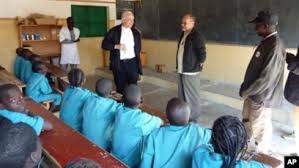
The Nestor Toukea School complex in Nkolmesseng, Yaoundé, remains closed, leaving hundreds of children and teachers without access to education, prompting alarm from local officials and parents.
Pr. Laurent Serge Etoundi Ngoa, Cameroon’s Minister of Basic Education, highlighted the gravity of the situation, describing the closure as “a crucial segment of the destiny of the academic, inventive, creative, and productive heritage of the future of a nation that is undoubtedly compromised.”
He warned that arbitrary administrative decisions depriving children of schooling threaten the nation’s long-term development.
The school, long considered an educational flagship in Yaoundé’s fifth district, has earned recognition for its organization and discipline, particularly during the Youth Day parade on February 11, 2025.
Yet, despite assurances and interventions from the Ministry of Basic Education, the school remains shuttered, leaving 600 children without classrooms and 50 teachers without assignments.
Officials and community members describe the school grounds as “a cemetery, a haunted place, a hospital brutally cleared of its patients,” reflecting the widespread frustration and despair among parents and educators.
“Nothing can save the situation, because everyone has left, the children in the streets, the parents in anger, and the teachers to the labor inspectorate. Six hundred children and fifty teachers are lost, irretrievably,” said a local observer.
The closure reportedly followed pressure linked to individuals previously convicted of forgery, whose interests appear to have influenced the administrative decision. While these individuals’ children continue to attend school normally, the wider student population bears the consequences.
President Paul Biya’s question, “What kind of Cameroon do we want for our children?” has taken on heightened significance as families and educators confront the fallout of the closure. The Ministry of Basic Education has been urged to take urgent action to reopen the school and restore stability, with experts stressing that the nation’s future hinges on the education and wellbeing of its youth.
Community leaders warn that prolonged inaction could exacerbate social inequalities, erode trust in public institutions, and compromise the intellectual and civic development of an entire generation.
The situation in Nkolmesseng now stands as a stark reminder of the fragility of educational access when governance and administrative accountability falter.



